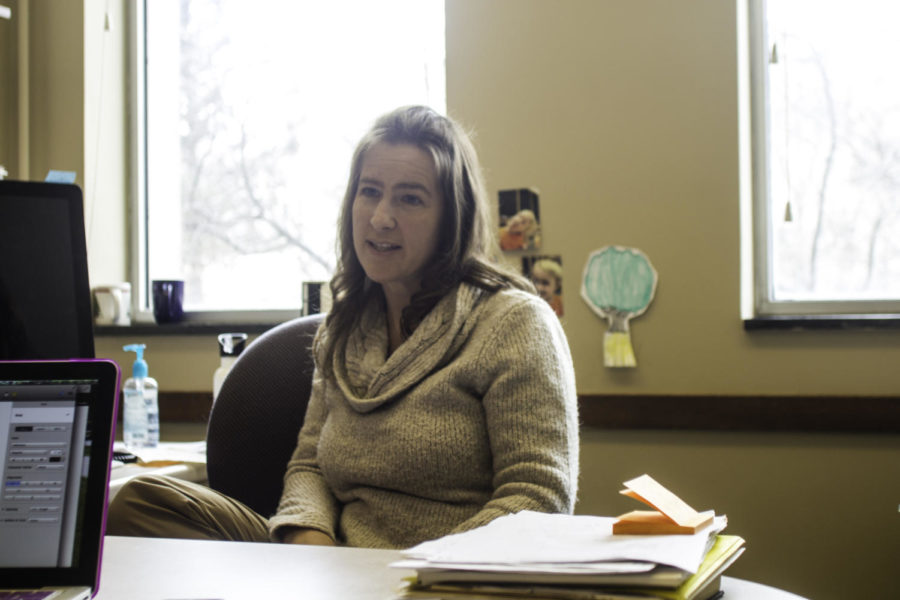Professor seeks to understand the effect of climate change on microbial communities
Tomhas Huhnke/Iowa State University
Iowa State University Professor Kirsten Hofmockel talks about the global warming scares and the intensity of her research in collaboration with multiple different researchers, February 25, 2014.
March 4, 2014
With quickly-rising levels of carbon dioxide contributing to global climate change, the peatland system — areas with lots of flora and fauna — is at risk of drying up and releasing even more carbon into the atmosphere.
Kirsten Hofmockel, assistant professor of ecology, evolution and organismal biology, recently received a grant of approximately $700,000 to study the responses of microorganisms that live in the boreal forest ecosystem in Minnesota.
Scientists are interested in learning how ecosystems are responding to global climate change in regards to how carbon is cycling through the peatland system. In order to figure out how plants and fungi are responding, scientists are manipulating the amount of carbon in a natural ecosystem.
Hofmockel is collaborating with other scientists and professors on a project called the Spruce and Peatland Responses Under Climatic and Environmental Change, which is located in the Marcell Experimental Forest just north of Grand Rapids, Minn.
Hofmockel and her team are trying to understand if carbon will cycle faster or if there will be changes in the way carbon is stored in the soil.
The concern in the boreal forests is that as the peat dries down because of global climate change, the carbon that has been stored will be released into the atmosphere, further increasing greenhouse gas concentration, Hofmockel said.
Hofmockel also said this could be a major problem because the boreal zone is large and undeveloped.
“There’s a lot of carbon being stored up there,” Hofmockel said.
Fan Yang, postdoctoral research associate of ecology, evolution and organismal biology, said that the peatland system they study is a particularly fragile ecosystem because it is vulnerable to temperature change.
The boreal zone doesn’t present an issue at the moment because, Hofmockel said, “these are saturated peats; the anaerobic [without oxygen], and the acidic conditions of a spruce forest means that decomposition is very slow.”
The concern pertains to future global climate change. The temperature would increase, as well as carbon, thereby increase the decomposition rate of peat, Yang said.
Hofmockel and Yang are studying bacteria and fungi, which are the best decomposers. By studying these microorganisms, they are trying to gain insights on how global climate change would impact the decomposition and nutrient cycling in the peatland system.
Their hypothesis is that with increased carbon dioxide and temperature, there will be more carbon underground, which would stimulate microbial populations and increase temperatures. Then there would be more decomposition of the peat.
Hofmockel and Yang are interested in projections and forecasting what is going to happen. They want to know how severe the impact of change will be.
A key priority in their research is discovering the key microorganisms involved in the carbon cycle and how they are responding to increased levels of carbon dioxide in the atmosphere.
Another hypothesis is that there isn’t a huge change in the overall atmospheric carbon dioxide, but that carbon is cycling faster. More carbon may be released, but more carbon is also being stored. Hofmockel finds this hypothesis unlikely.
Plants use the carbon dioxide from the atmosphere and give it the fungi. The fungi, in turn, gives the plant nitrogen, which allows the plant to increase in its bio mass.
However, Hofmockel said that if the microbe gets the carbon in the soil, the carbon will be respired and released into the atmosphere as a greenhouse gas.
Hofmockel also wants to know if plant growth will balance the carbon dioxide that is being given off into the atmosphere.
“There’s so much we don’t know about microbial metabolism,” Hofmockel said.
She also said it’s difficult to study the microorganisms because they can’t be isolated from their environment.
Last summer, Hofmockel and Yang collected samples from the project site to establish a baseline in plant-microbial interactions.
They’re hoping that the carbon dioxide will be turned on in the forest simulation chambers this summer so they can begin collecting data that will help them determine how rising carbon dioxide levels will affect the peatland ecosystem.

















